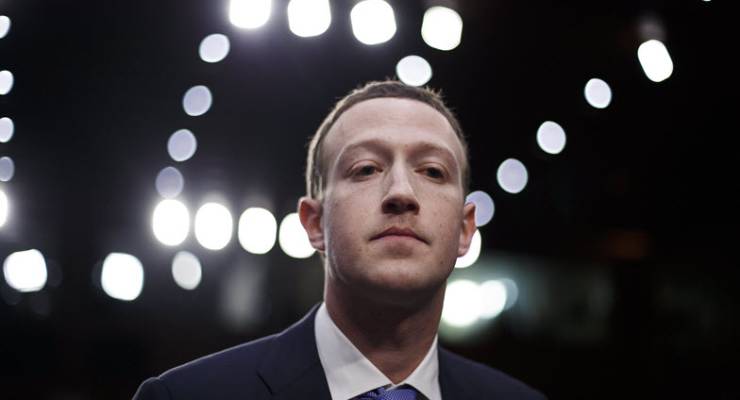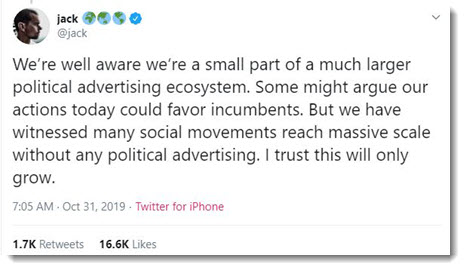
Twitter’s editorial policies have never been entirely fair, or even consistent. So the company’s latest commonsense decision has come as a surprise: Twitter will introduce a blanket ban on all political advertising.
Citing concerns around “highly optimised and targeted political messages” being forced on unwilling users, CEO Jack Dorsey has announced that — save for a few exceptions around voter registration to be clarified in mid-November — Twitter will ban paid political ads from November 22.
The move is being widely celebrated, and follows Google’s recent ban of political advertising in Canada. Google, however, only put that down to the country’s tighter transparency laws. The decision also contrasts wildly with the actions of Dorsey’s counterpart at Facebook, Mark Zuckerberg. Despite facing increasing pressure post-Cambridge Analytica and the whole Russian interference fiasco, Zuckerberg refused to even ban false advertising this month.
Facebook employees have this week petitioned to regulate false political ads to the same standard as regular ones, but Zuckerberg argues that a blanket ban would favour incumbents. This is an argument specifically dismissed by Dorsey:
Ahead of the 2020 election, Zuckerberg has only committed to ending commissions for employees selling political ads and “clearer fact-checking labels“. The Facebook CEO was already getting grilled in congress last week for the inadequacy of these measures. The pressure is only going to get worse from here…









Between Facebook paid manure-spreading, the expected grubby work of Crosby-Textor for BoJo, and now the loony Qanon conspiracy theorists guiding our own Scumbag – you wonder whether truth and common sense stands any chance at all in Oz/UK/US politics.
At least Germany is cranking up positive action against their violent white right-wing extremists…
Perhaps a good move, but the argument will now just shift to what does or doesn’t constitute ‘political advertising’. As an example (and recognising it is a different platform), when Donald Trump posts a tweet falsely decrying the latest Democrat offence, is this a political advertisement?
In my opinion, the current debate is heading the wrong way. Despite some similarities (such as receiving revenue from advertising), platforms such as FaceBook, YouTube and Twitter are NOT publishing houses in the same sense as traditional media. Instead, they enable user self-publication. Forcing the older media model on to these new organisation has potential for disastrous consequences. Do we really want to legitimise big corporations’ role as global censors? It’s not so bad now when we’re talking about things we all agree should be banned, like live streaming mosque murders. However; what about more contentious issues? I think big corporates have far too much power already. I am very wary of handing them the additional right to determine who can say what and when.
I think governments should be working (internationally, if necessary) to set guidelines and regulations for the self-publishers themselves. I know this is a complex and difficult thing to do, but ethically, at least, accountability for content should remain with the publisher, not the platform.
Exactly Graeski, responsibility should remain with the real publisher and Big Tech should have less censorship rights not more. I commented last week Zuck is right about fake news being hard to determine and I’d add here deciding whose political ads are ok is even more fraught.
There’s always been plenty of egregious lies in everyday politics and advertising thereof. The sky is not falling in any faster than before and the gullible as well as the mendacious will always be with us. People are no smarter or dumber since the internet and smart phones. Everybody gets their own chance to be a bullshit artist.
Trump’s tweets don’t count, they’re only banning paid advertising.
Exactly! Germany introduces legislation that could stop Facebook in its tracks.
They hired people and cleaned up the mess.
What’s the problem with our government?
Oh, you mean that Schmo wouldn’t be PM without Facebook and Clive Palmer’s last party called The United Australia Party $68,000,000 campaign against Labor.
Damn good idea by Twitter. The rich won’t like it because they rely on using mountains of money to influence people to vote against their best interests, by churning up prejudice and straight-out lies.